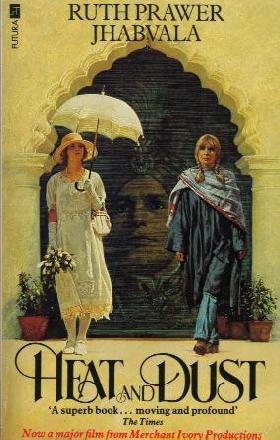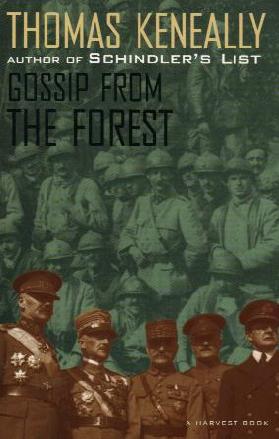
Ruth Prawer Jhabvala
The following novels constitute the shortlist for the 1975 Booker Prize:
Notable Omissions from the 1975 Shortlist

|
Heat and Dust Ruth Prawer Jhabvala |
Dustjacket synopsis:
"HEAT AND DUST is set in India, the story of Olivia, beautiful, spoilt, bored, who
outrages society in the tiny, suffocating town where her husband is a civil servant, by eloping with
an Indian prince - and of her step-granddaughter, who 50 years later, goes back to the heat,
the dust and the squalor of the Satipur bazaars to solve the enigma of Olivia's scandal."
Quotes:
"A superb book...A complex story line, handled with dazzling assurance...moving and
profound. Ruth Prawer Jhabvala has not only written a penetrating and compassionate love
story, she has also exposed the soul and nerve ends of a fascinating and compelling
country. This is a book of cool, controlled brilliance. It is a jewel to be treasured" -
The Times
First Paragraph:
Shortly after Olivia went away with the Nawab, Beth Crawford returned from Simla. This was in September, 1923. Beth had to go down to Bombay to meet the boat on which her sister Tessie was arriving. Tessie was coming out to spend the cold season with the Crawfords. They had arranged all sorts of visits and expeditions for her, but she stayed mostly in Satipur because of Douglas. They went riding together and played croquet and tennis and she did her best to be good company for him. Not that he had much free time, for he kept himself as busy as ever in the district. He worked like a Trojan and never ceased to be calm and controlled, so that he was very much esteemed by both his colleagues and by the Indians. He was upright and just. Tessie stayed through that cold season, and through the next one as well, and then she sailed for home. A year later Douglas had his home leave and they met again in England. By the time his divorce came through, they were ready to get married. She went out to join him in India and, like her sister Beth, she led a full and happy life there. In the course of time she became my grandmother - but of course by then everyone was back in England.From the Futura paperback edition, 1984.

|
Gossip from the Forest Thomas Keneally |
Dustjacket synopsis:
"The unimaginable slaughter that has become the First World War has continued unabated since
August 1914, and now, in the late fall of 1918, on an obscure railway siding at Compiègne,
France, a group of intractable old men gather to negotiate an armistice. With Allied
victory a certainty, monumental old Marshall Foch, flanked by Maxime Weygand and British
Admiral Wemyss, seeks to crush the enemy at the negotiating table. With the Kaiser in
seclusion, idealist Matthias Erzberger has been dispatched to pick what shards of mercy he
can from the wreckage of the old order. As the Allied leaders press for total submission,
Erzberger, haunted by the prospect of famine and revolution in the gathering German winter,
angles for better terms. And so they talk on and on, as the guns roar and men continue to
die.
"With the acute historical sensibility that is the hallmark of his work, Thomas Keneally has re-created the forging of the armistice in an illuminating and intimate portrayal of personal prejudice and political obstinacy."
Quotes:
"Thomas Keneally's Gossip from the Forest belongs with... Solzhenitsyn's August
1914, [both] books that delineate the past in sympathetic depth and so urge the
reader to enter it." - The New York Times Book Review
"Bravura has been the breath of life to Thomas Keneally. In this books he sets himself, with his
usual passionate exuberance, to study the conjunction of men who met in the railway coaches in the
forest of Compiègne to sign the 1918 Armistice." - Anne Duchêne, The Times Literary Supplement
"The novel is technically a tour-de-force, entirely gripping and . . . . very moving." - C.J. Driver Guardian
"With the sweeping perceptiuon most historians miss he's worked history, speculation, rumour into the cunningest of
documentaries. All in all, an extremely gripping, as well as important historical fiction." - Valerie Cunningham,
New Statesman
"Mr Keneally has intricate mastery over the matters of fact, but it is the heat of his imagination that
astonishes. Dreams, spasms of feeling, lightning analyses of life-long characteristics are merged with history's
fixed assertions, and seem at least as valid in this totally assured book." - Mary Sullivan, Sunday Telegraph
First Paragraph:
On Wednesday afternoon, at his headquarters in Senlis, the Marshal had a visit from the Premier of France. They read through the agenda of the meeting in the forest. When that business was finished, the premier wanted to chat. The Marshall could tell that the old man was secretly seeking reassurance. In spite of that need, the Premier did not abandon his tone of mocking.
They sat by the fire in the Marshal's office on the ground floor. The Marshal's armies went forward up every main and country road. although they were not used to such movement they had no need to appeal to him. Therefore few staff and liaison officers infested the park, no staff limousines cluttered the gravel under the terraces. Without hard-driven generals to salute, the chasseurs at the main steps kept a sleepy watch all afternoon. It was quiet enough and dim enough in the drizzling park to throw the nightjars into disorder. They sat in a birch tree from noon onwards, calling endlessly.
From the Harcourt Brace paperback edition, 1985.
You can read full details of this and other novels by Tom Keneally on this webpage page.
Notable Omissions from the Shortlist:
"The History Man", Malcom Bradbury
"Poor Fellow My Country",
Xavier Herbert
"Changing Places", David Lodge
This page and its contents are copyright © 2005 by Perry Middlemiss, Melbourne, Victoria, Australia.
Last modified: October 18, 2005.